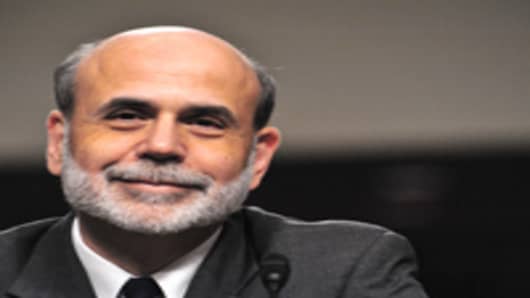The US economy is on a firmer footing, but high unemployment and still low inflation warrant continuing support, according to minutes from the Fed's latest meeting which showed clear divisions among the Federal Open Market Committee (FOMC) members on exit strategy.
The market initially took the details of the March meeting as hawkish but some — and it is speculated that Ben Bernanke himself makes up part of that some — believe the Fed's ultra-loose monetary policy stance will need to be maintained beyond 2011.
The uncertainty is whether maintaining ultra-loose monetary policy means keeping interest rates at near zero into next year or prolonging the second round of quantitative easing (QE2) — a way of creating money by buying assets such as bonds from the market.
Whether this question will be answered following April's meeting and historic press conference with Ben Bernanke remains unclear, but it appears the battle between those who worry about inflation and those who worry about unemployment rages on at the Federal Reserve.
For investors, this means attempting to second guess the Fed on the assumption that the market will actually move when the central bank signals it will change policy, rather than follow when the Fed actually moves.
"Don't wait for the first Fed hike. In the past, the key start of tightening moment for equities was the first Fed hike," said Ronan Carr, a European Strategist at Morgan Stanley in London in a research note.
"This time we expect markets to price in tightening sooner with the ECB moving earlier, QE2 coming to an end and the Fed potentially changing their language," Carr added.
"Equities don't like it when QE ends. Recent turning points for US equities coincided with the start and end of QE. Similarly Japanese equities rolled over in 2004 when FX intervention ended and again in 2006 when QE ended. The end of QE in Japan and last time in the US was a negative catalyst for Financials and some cyclicals," he added.
"In terms of market timing, it usually paid to wait for the first hike. However, the Fed may not raise interest rates for some time yet," Carr said.
Instead of waiting for an actual move Carr believes investors should watch for a change in language from the Fed with "exceptionally low" and "extended period" the key terms to watch.
"The Fed has said it will end QE2 at the end of June. This would certainly represent the 'end of easing', if not a stepping-stone to the 'start of tightening'. Moreover, recent comments from Fed Governor Bullard hinted at a possible premature end to QE2," he pointed out.
The question you then need to ask yourself is who is in charge at the Fedand how will they influence policy amid fears over jobs and inflation.
If 'Helicopter Ben' is in charge, second guessing an end to QE2, higher rates and a return to normal could be an expensive mistake.



